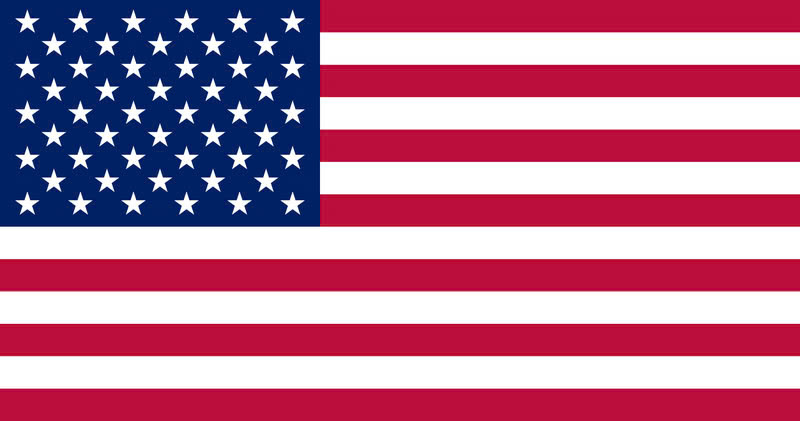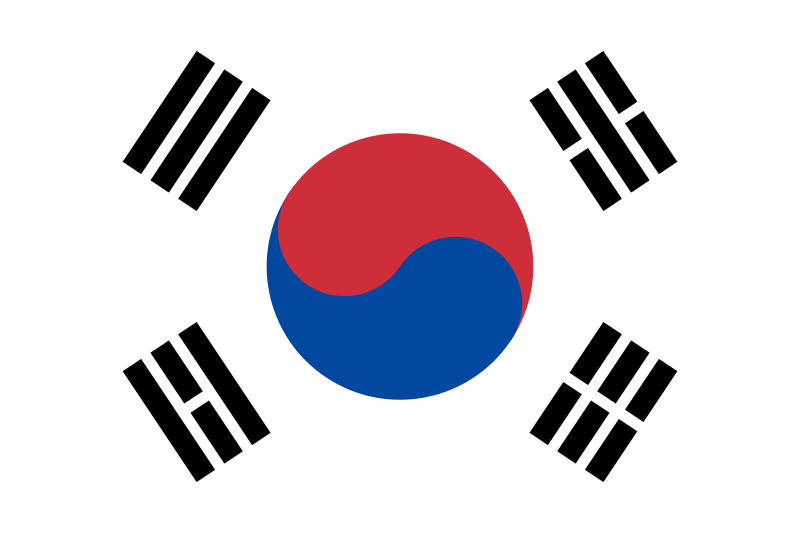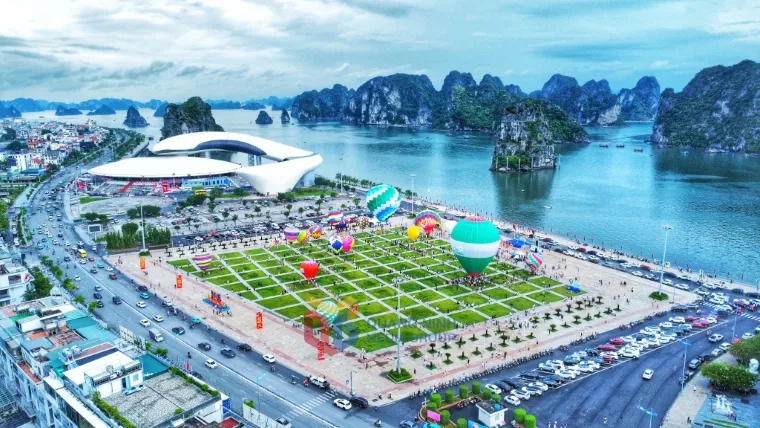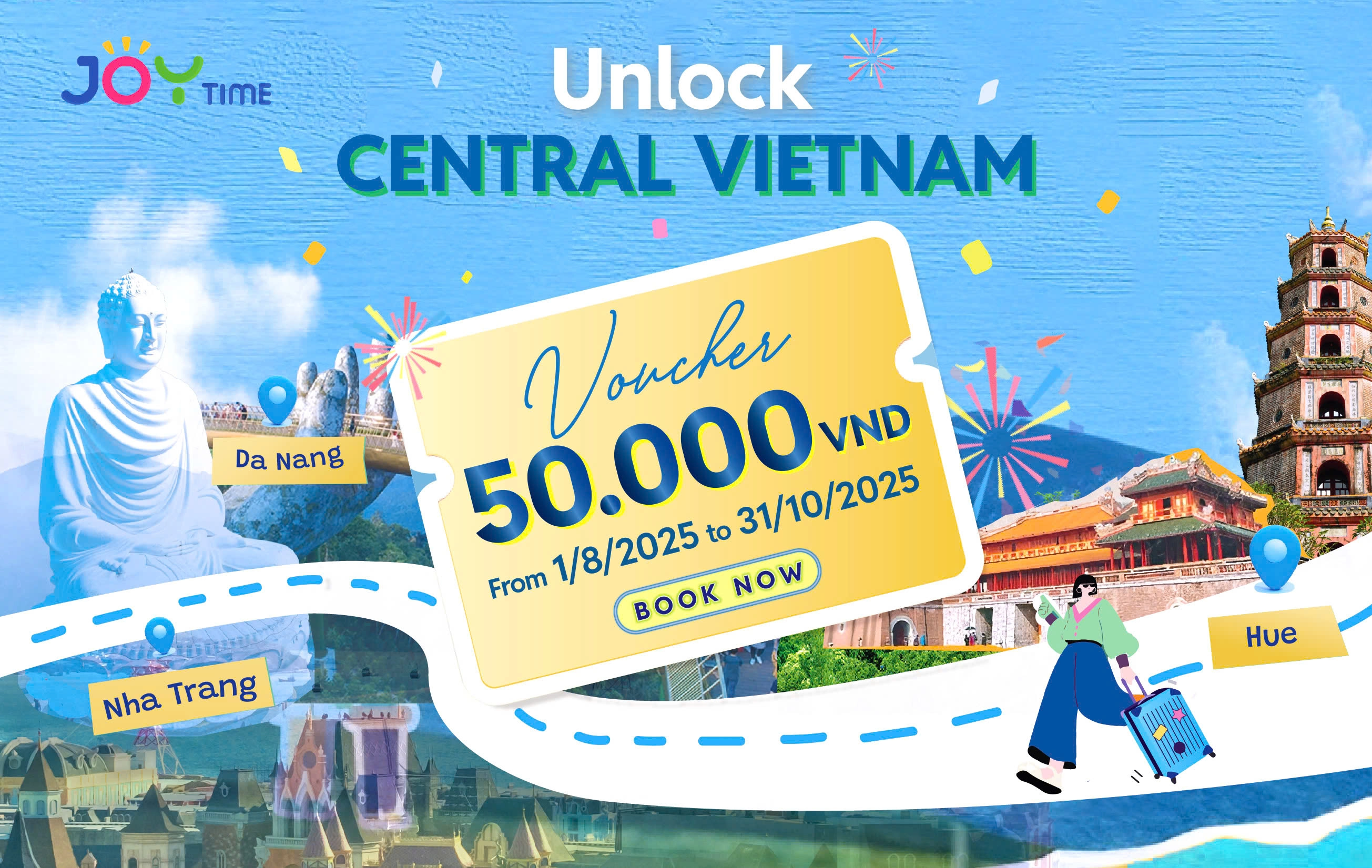Traditional Festivals in Ha Long Bay: A Cultural Journey Beyond the Karsts
A UNESCO World Heritage Site, Ha Long Bay is famous for its emerald waters and limestone karsts, but it also boasts a rich cultural scene. Known as the "City of Festivals," Ha Long hosts 10-15 major events annually, offering a deep dive into Vietnam’s heritage. From spiritual ceremonies to lively fishing village festivals, these celebrations highlight the region’s maritime traditions, historic battles, and religious practices.
This comprehensive guide unveils the most significant traditional festivals in Ha Long Bay and the surrounding Quang Ninh province, helping you plan your cultural journey and immerse yourself in experiences that go far beyond the typical tourist trail.
Tet Nguyen Dan (Lunar New Year) in Ha Long Bay
When: Late January or early February (first three days of the first lunar month)
The Lunar New Year, or Tet, is Vietnam's most important celebration, and experiencing it in Ha Long offers a unique perspective on this nationwide festival. As families reunite and communities gather to welcome the coming spring, Ha Long transforms with festive decorations, special rituals, and vibrant activities.
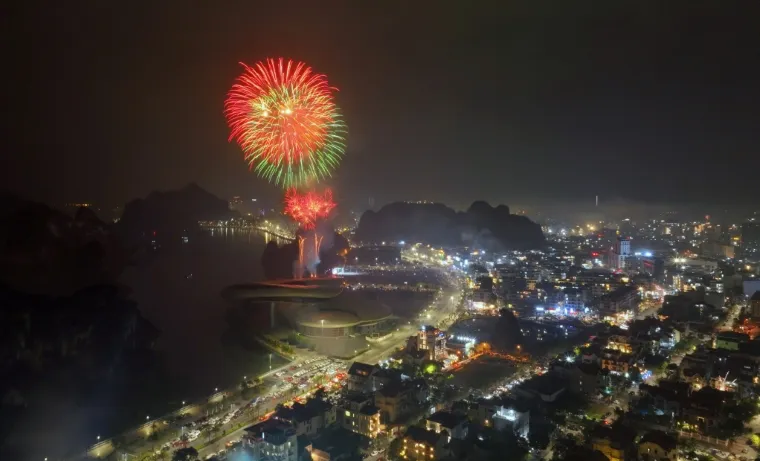
Experience Vietnam’s most important celebration in Ha Long, where Tet brings spiritual rituals, family reunions, and festive energy to the coastal city - Photo Source: Báo Quang Ninh
Cultural Significance
Tet marks the beginning of spring and symbolizes new beginnings filled with hope and prosperity. Deeply rooted in Vietnamese culture, it represents a time for family reunions, honoring ancestors, and setting positive intentions for the year ahead.
Key Activities
-
Spectacular midnight fireworks over Ha Long Bay to welcome the New Year
-
Spring artistic performances featuring traditional music, dance, and theater
-
Temple and pagoda visits, particularly to Long Tien Pagoda and Loi Am Pagoda, where locals pray for good fortune
-
Traditional Tet delicacies available at markets and food stalls
-
Old Quarter exploration, beautifully adorned with New Year decorations
-
Traditional games and cultural demonstrations across the city
Visitor Experience
During Tet, Ha Long takes on a special atmosphere as businesses close and families prioritize celebrations. While some tourist services may be limited, witnessing authentic local traditions provides an unparalleled cultural experience. The reduced crowd at major attractions can also offer a more peaceful way to enjoy the bay's scenery. And for the perfect sunset, head to Hon Gai Harbour, a fantastic spot to capture both the local life and breathtaking views.
If you're looking for more scenic spots, refer to Places to watch sunset in Ha Long Bay offer incredible views as the sun sets over the water, creating a magical atmosphere.
"Visiting Ha Long during Tet gives you a rare glimpse into Vietnamese family traditions and community celebrations," says cultural tour guide Nguyen Minh. "The energy is different—more intimate and authentic. You're not just observing culture; you're participating in it."
Tran Quoc Nghien Temple Festival
When: April 29-30 or April 30-May 1
Coinciding with Ha Long Tourism Week, this significant festival honors a key historical figure in Vietnam's rich past and showcases the region's proud heritage. You can visit Photo spots in Ha Long Bay to capture the spirit of the event with its vibrant processions and rituals against the stunning backdrop.
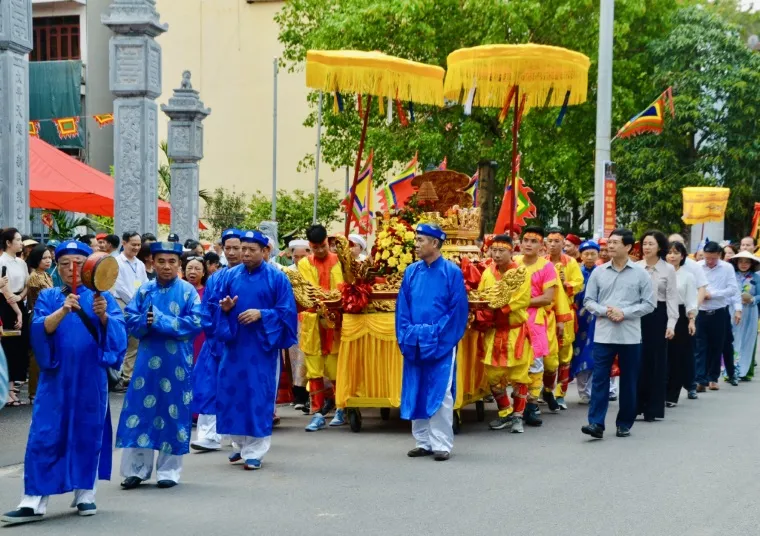
A vibrant celebration honoring a historic military figure through processions, rituals, and cultural performances at the foot of Bai Tho Mountain - Photo Source: Báo Quảng Ninh
Cultural Significance
The festival commemorates Tran Quoc Nghien, the eldest son of the legendary general Tran Hung Dao, who played a crucial role in Vietnam's history. Revived in 2008, this celebration reminds locals and visitors alike of the region's heroic past, fostering community pride and preserving cultural values associated with the Bai Tho Mountain historical complex.
Key Activities
-
Solemn procession carrying Tran Quoc Nghien's palanquin through Ha Long City streets
-
Traditional rituals at the temple, including ceremonial offerings and prayers
-
Dragon and lion dances that fill the streets with color and movement
-
Cultural performances highlighting historical events and local traditions
-
Community gatherings featuring folk games and shared meals
Location
The festival takes place at Tran Quoc Nghien Temple, situated at the foot of Bai Tho Mountain in the Ben Doan area of Ha Long City. The temple, constructed in the late 13th century, serves as a focal point for cultural preservation and community gathering.
Giang Vong Village Festival
When: 9th and 10th days of the 11th lunar month
With a 300-year history, this festival represents one of the most authentic local celebrations in Ha Long, honoring the area's fishing heritage and ancestral traditions.
Cultural Significance
This ancient folk festival pays tribute to the village guardian deity, various saints, and the seven ancestors of the village's seven major family lineages. It symbolizes the deep connection between the fishing communities and their maritime livelihood, preserving traditions that have sustained local culture for centuries.
Key Activities
-
Distinctive water procession ceremony, a unique ritual reflecting the local fishing culture
-
Procession of two restored royal decrees, carried with great reverence
-
Ceremonial worship and incense offerings
-
Community feasts bringing together villagers and visitors
-
Traditional music and folk performances specific to the coastal region
Location
The festival takes place at Giang Vong Communal House (also known as Cai Da Communal House) in Ha Khanh Ward, Ha Long City.
Long Tien Pagoda Festival
When: 24th day of the 3rd lunar month
While Long Tien Pagoda welcomes visitors year-round, especially on the 1st and 15th day of each lunar month and during Tet, its annual festival represents a spiritual highlight for locals and travelers alike.
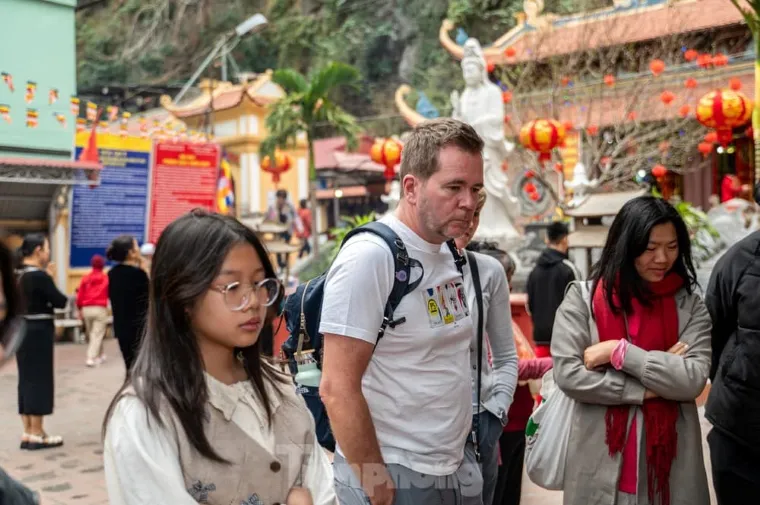
A spiritual festival blending Buddhist prayers and patriotic reverence, centered at a historic pagoda beneath Bai Tho Mountain - Photo Source: Chùa Long Tiên - TP Hạ Long
Cultural Significance
This important spiritual event allows local residents and visitors to pray for good fortune, health, and peace. It reflects Vietnamese Buddhist beliefs while also honoring national heroes, creating a blend of religious devotion and patriotic sentiment.
Key Activities
-
Palanquin procession carrying Tran Quoc Nghien's altar tablet from the pagoda to Duc Ong Temple and An Duong Vuong Temple before returning
-
Floating lanterns in the evening, creating a magical atmosphere as they drift across the water
-
Incense offerings, Buddha worship, and sutra chanting
-
Traditional folk games and cultural performances
Location
Long Tien Pagoda sits at the foot of Bai Tho Mountain in Ha Long City, offering not only spiritual significance but also stunning views of the bay. Built in 1941, the pagoda has become an important cultural landmark.
Ba Men Temple Festival
When: 19th and 20th days of the 1st lunar month
This unique celebration brings together fishing communities from across Ha Long Bay, offering insights into the maritime culture that has shaped the region for generations.
Cultural Significance
The festival deeply reflects the beliefs and culture of fishing villages throughout Ha Long Bay. It serves as an occasion for fishermen from Ha Long and Cat Ba to gather and pray for safety at sea and bountiful catches in the coming year.
Key Activities
-
Ceremonial offerings of incense, flowers, and tributes from the 19th until noon on the 20th
-
Boat racing competition between fishing villages beginning at noon on the 20th
-
Community prayers for maritime safety and prosperity
-
Traditional fishing demonstrations and related cultural activities
Location
Ba Men Temple is situated on Ha Long Bay, accessible primarily by boat, making the journey to the festival part of the authentic experience.
Bach Dang Festival (Quang Yen)
When: Around the 8th day of the 3rd lunar month (typically falls in April)
This major historical celebration commemorates one of Vietnam's most significant military victories and draws visitors from across the country.
Cultural Significance
The Bach Dang Festival honors three historic victories against northern invaders on the Bach Dang River (by Ngo Quyen in 938, Le Hoan in 981, and Tran Hung Dao in 1288). It epitomizes the Vietnamese tradition of "remembering the source when drinking water" and promotes national pride and community cohesion. The area has been designated as a Special National Historic Site.
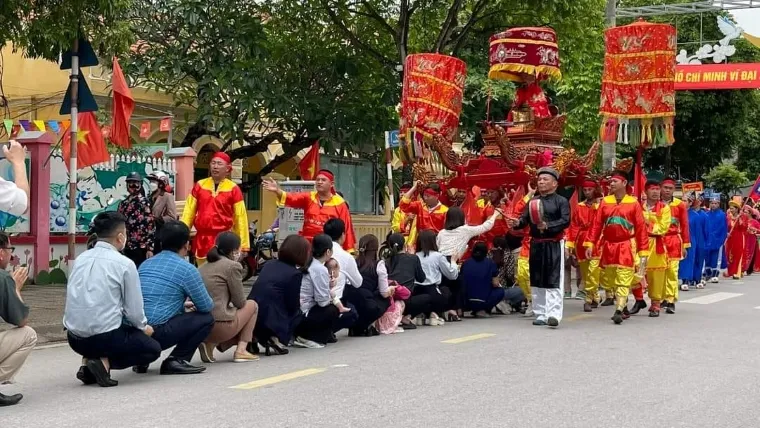
A major historical festival commemorating Vietnam’s legendary river battles with reenactments, boat races, and ancestral ceremonies - Photo Source: Facebook Di tích Quốc gia đặc biệt Bạch Đằng, Quảng Yên, Quảng Ninh
Key Activities
-
Procession of Tran Hung Dao's statue from Bach Dang Linh Tu Temple to Yen Giang Communal House and back
-
Historical reenactments of battle elements (including the famous stake strategy used to defeat the Mongol fleet)
-
Traditional boat races
-
Ceremonial rituals including ancestral worship and memorial services for fallen soldiers
-
Folk games such as wrestling, human chess, and cockfighting
Location
The festival takes place at the Bach Dang Historical Site in Quang Yen town, encompassing several locations including Tran Hung Dao Temple, King and Queen Shrine, and various communal houses (Yen Giang, Trung Ban, Dien Cong, and Trung Coc Temple).
Quan Lan Festival (Van Don)
When: 10th to 20th day of the 6th lunar month, with main celebrations on the 18th
This island celebration combines historical commemoration with maritime culture, showcasing the distinctive traditions of Ha Long Bay's island communities.
Cultural Significance
The festival commemorates the victory over Mongol invaders in 1288 led by General Tran Khanh Du. Simultaneously, it serves as a harvest festival for maritime communities, praying for favorable weather and abundant fishing. Recognized as a National Intangible Cultural Heritage, it demonstrates the martial spirit of coastal people in defending national sovereignty.
Key Activities
-
Boat racing competition (boi chai) that reenacts the historic battle
-
Palanquin procession carrying Tran Khanh Du's altar tablet from the temple to the village communal house (on the 16th)
-
Ceremonial rituals including "village closing" (on the 10th), military training, deity worship at the village pagoda (12th-15th), and camp establishment (17th)
-
Culinary competitions, chau van singing, and folk games
Location
The festival takes place on Quan Lan Island in Van Don district, with main events occurring at Quan Lan Communal House and the nearby Dinh/Mang River area.
Cua Ong Temple Festival
When: Main spring festival from the 2nd day of the 1st lunar month through the 3rd lunar month, with the main celebration on the 3rd day of the 2nd lunar month (held every two years)
This grand celebration at one of the region's most important temples attracts pilgrims and cultural enthusiasts from across Vietnam.
Cultural Significance
The festival honors Hung Nhuong Dai Vuong Tran Quoc Tang (son of Tran Hung Dao) and other Tran dynasty figures. It embodies the tradition of ancestral gratitude and inspires national pride. The temple is recognized as a Special National Historical Relic.
Key Activities
-
Major procession (held biennially) carrying Duc Ong from the Lower Temple to the shrine at Vuon Nhan and back
-
Incense offerings and prayers
-
Folk games including tug-of-war, cockfighting, pushing sticks, blindfolded drum hitting, and boat racing
-
Ceremonial food offerings competitions
-
Evening performances and fireworks
Location
Cua Ong Temple is located in Cua Ong Ward, Cam Pha City, about 50 kilometers from Ha Long City center.
Yen Tu Spring Festival (Uong Bi)
When: Beginning on the 10th day of the 1st lunar month and lasting through the 3rd lunar month
As one of Vietnam's largest Buddhist pilgrimages, this extended celebration attracts thousands of visitors seeking spiritual connection and cultural experiences.
Cultural Significance
This major Buddhist pilgrimage festival honors King-Monk Tran Nhan Tong, founder of Vietnam's Truc Lam Zen sect. Yen Tu is considered the homeland of Vietnamese Buddhism, and the festival embodies ancestral gratitude while offering prayers for national peace and personal fortune.
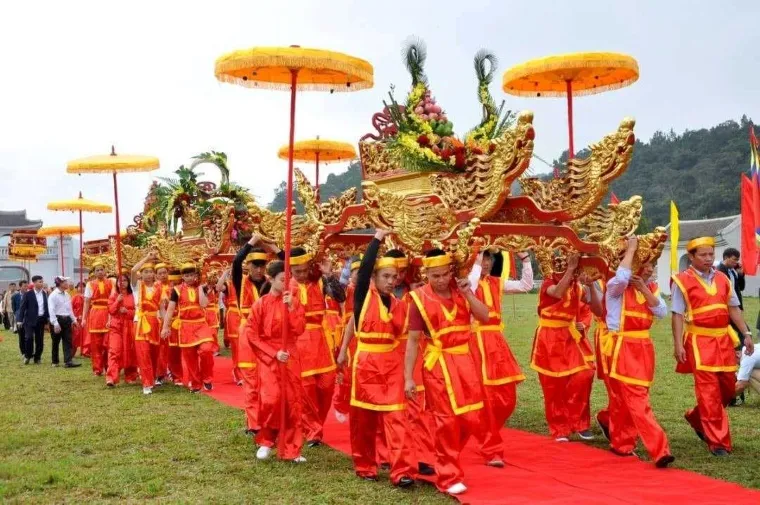
One of Vietnam’s biggest Buddhist pilgrimages, where visitors ascend the sacred Yen Tu Mountain in search of peace, blessings, and cultural depth - Photo Source: Facebook Tin tức Uông Bí 24/7
Key Activities
-
Opening ceremony on the 10th day of the 1st lunar month at Truc Lam Yen Tu Cultural Center
-
Blessing rituals, prayer services, and the application of sacred Yen Tu seals
-
Grand procession with thousands of participants
-
Pilgrimage journey up the mountain (over 6km) visiting pagodas, shrines, and stupas, culminating at Dong Pagoda at the summit
-
Folk games, traditional artistic performances, martial arts demonstrations, and dragon dances
Location
The festival spans the Yen Tu Scenic and Historical Site in Thuong Yen Cong Commune, Uong Bi City, about an hour's drive from Ha Long City.
Tien Cong Festival (Quang Yen)
When: 5th to 7th day of the 1st lunar month, with main celebrations on the 7th
This unique celebration honors both village founders and living elders, showcasing a distinctive aspect of Vietnamese cultural values.
Cultural Significance
The festival honors the "Tien Cong" - pioneer ancestors who established villages in the Ha Nam island area of Quang Yen. Its most distinctive feature is the "Carrying the Elders" ceremony, celebrating and honoring living village elders who have reached 80, 90, or 100 years of age. Recognized as a National Intangible Cultural Heritage, it demonstrates profound respect for longevity and ancestral contributions.
Key Activities
-
The centerpiece "Carrying the Elders" ceremony: elderly men and women are respectfully carried in ornate palanquins by their descendants to Tien Cong Shrine
-
Both collective processions and individual family processions
-
Ceremonial rituals at Tien Cong Shrine
-
Folk games (to tom diem, chess, swinging)
-
Traditional dum singing and quan ho folk songs
Location
The festival takes place in the Ha Nam island area of Quang Yen town, with main rituals held at Tien Cong Shrine in Cam La commune.
Other Notable Traditional Festivals
The cultural landscape of Ha Long and surrounding Quang Ninh province features numerous other traditional celebrations worth exploring:
-
Cai Lan Temple Festival: Bai Chay Ward, Ha Long. Held on the 10th day of the 1st lunar month.
-
Bang Ca Village Festival: Ha Long. Features participation from Dao Thanh Y ethnic minority people.
-
Dai Ky Phuc Dinh Nghe Van Yen Festival: Ha Long.
-
Cau Ngu (Fisherman's) Festival: Held on the 8th day of the 1st lunar month in Ha Long and various coastal communities. A traditional fishermen's festival praying for safety at sea.
-
Chau Van Festival: Ha Long. Features competitive chau van singing, honoring sea deities.
-
An Sinh Temple Festival: Dong Trieu. Commemorates Tran dynasty kings and Tran Hung Dao (around the 20th day of the 8th lunar month).
-
Xuong Dong Festival: Quang Yen. An agricultural festival recognized as National Intangible Cultural Heritage.
-
Ethnic minority festivals: Including the New Rice Festival (Tay people) and Dai Phan Festival (San Diu people) in Ha Long.
-
Loi Am Pagoda Festival: Ha Long.
Planning Your Cultural Festival Journey
Seasonal Festival Calendar
For travelers hoping to experience Ha Long's traditional festivals, planning according to the lunar calendar is essential. Here's a seasonal breakdown to help you organize your cultural journey:
Spring (1st-3rd Lunar Months, roughly January-April):
-
Tet Nguyen Dan (Lunar New Year)
-
Long Tien Pagoda Festival
-
Yen Tu Spring Festival
-
Cua Ong Temple Festival
-
Bach Dang Festival
-
Tien Cong Festival
-
Ba Men Temple Festival
-
Cai Lan Temple Festival
Summer (6th Lunar Month, roughly June-July):
-
Quan Lan Festival
Autumn (8th & 11th Lunar Months, roughly September-December):
-
Cua Ong Temple Festival (autumn session)
-
An Sinh Temple Festival (Dong Trieu)
-
Giang Vong Village Festival
Helpful tips and seasonal guidance for travelers looking to time their visit with Ha Long’s most meaningful cultural celebrations - Photo Source: Báo Quảng Ninh
Practical Tips for Festival Visitors
Verify Dates: Always confirm the exact dates for each festival as they follow the lunar calendar and shift annually on the Gregorian calendar. Minor variations in dates may exist between sources, so checking closer to your planned visit is advisable.
Choose Your Experience Style: Select locations based on your preferences:
-
Relaxing (cruise decks, beaches, cafes)
-
Active (joining processions, participating in folk games)
-
Cultural immersion (village festivals, spiritual ceremonies)
-
Luxury or local experiences (high-end events vs. community celebrations)
Make Advance Arrangements: For popular festivals like Yen Tu or major temple celebrations, consider arranging accommodation and transportation in advance, especially during peak tourism periods.
What to Bring: Camera, appropriate clothing for temple visits (modest attire with covered shoulders and knees), comfortable walking shoes, water, and small offerings if you wish to participate in ceremonies.
Cultural Etiquette: When attending festivals, particularly at sacred sites like pagodas, temples, and communal houses, observe these important guidelines:
-
Dress modestly and appropriately (avoid revealing clothing)
-
Speak softly and move respectfully
-
Remove shoes when entering certain temple buildings
-
Ask permission before photographing ceremonies or individuals
-
Make small donations at temples if participating in rituals
Suggested Cultural Itineraries
Three-Day Spring Festival Tour:
-
Day 1: Explore Ha Long City during Tet celebrations, visit Long Tien Pagoda
-
Day 2: Take a day cruise to see floating villages and Ba Men Temple
-
Day 3: Travel to Yen Tu for the Spring Festival pilgrimages
Spiritual Journey Week:
-
Days 1-2: Ha Long Bay cruise with visits to cave temples
-
Days 3-4: Yen Tu Festival exploration and mountain pilgrimage
-
Days 5-6: Cua Ong Temple Festival and surrounding cultural sites
-
Day 7: Visit smaller local pagodas and temples in Ha Long City
Historical Festivals Focus:
-
Days 1-2: Bach Dang Festival in Quang Yen
-
Day 3: Tran Quoc Nghien Temple Festival in Ha Long
-
Day 4: Historical sites around Ha Long related to the Tran dynasty
-
Day 5: Quan Lan Island historical exploration
Conclusion: Beyond the Limestone Karsts
Ha Long Bay's traditional festivals offer a profound window into Vietnam's cultural soul, adding rich layers of meaning to this world-famous natural wonder. These celebrations—from solemn ceremonies honoring historical heroes to joyous fishing village gatherings—reveal the deep connection between the bay's communities and their maritime heritage, spiritual beliefs, and historical triumphs.
For travelers willing to venture beyond standard tourist circuits, these festivals provide authentic cultural immersion opportunities that create lasting connections and understanding. The dynamic calendar of events throughout the year ensures that almost any visit can include some form of cultural celebration, whether grand historical commemorations or intimate local ceremonies.
As you plan your journey to Ha Long Bay, consider timing your visit to coincide with these traditional festivals, allowing you to experience not just the breathtaking landscapes but also the living heritage that makes this region truly special. The limestone karsts may capture your camera's attention, but it's the cultural festivals that will capture your heart.
|
Joytime Travel Agency - Travel JOY, TIMEless Vietnam Follow us for travel tips, local insights, and exclusive offers:
|
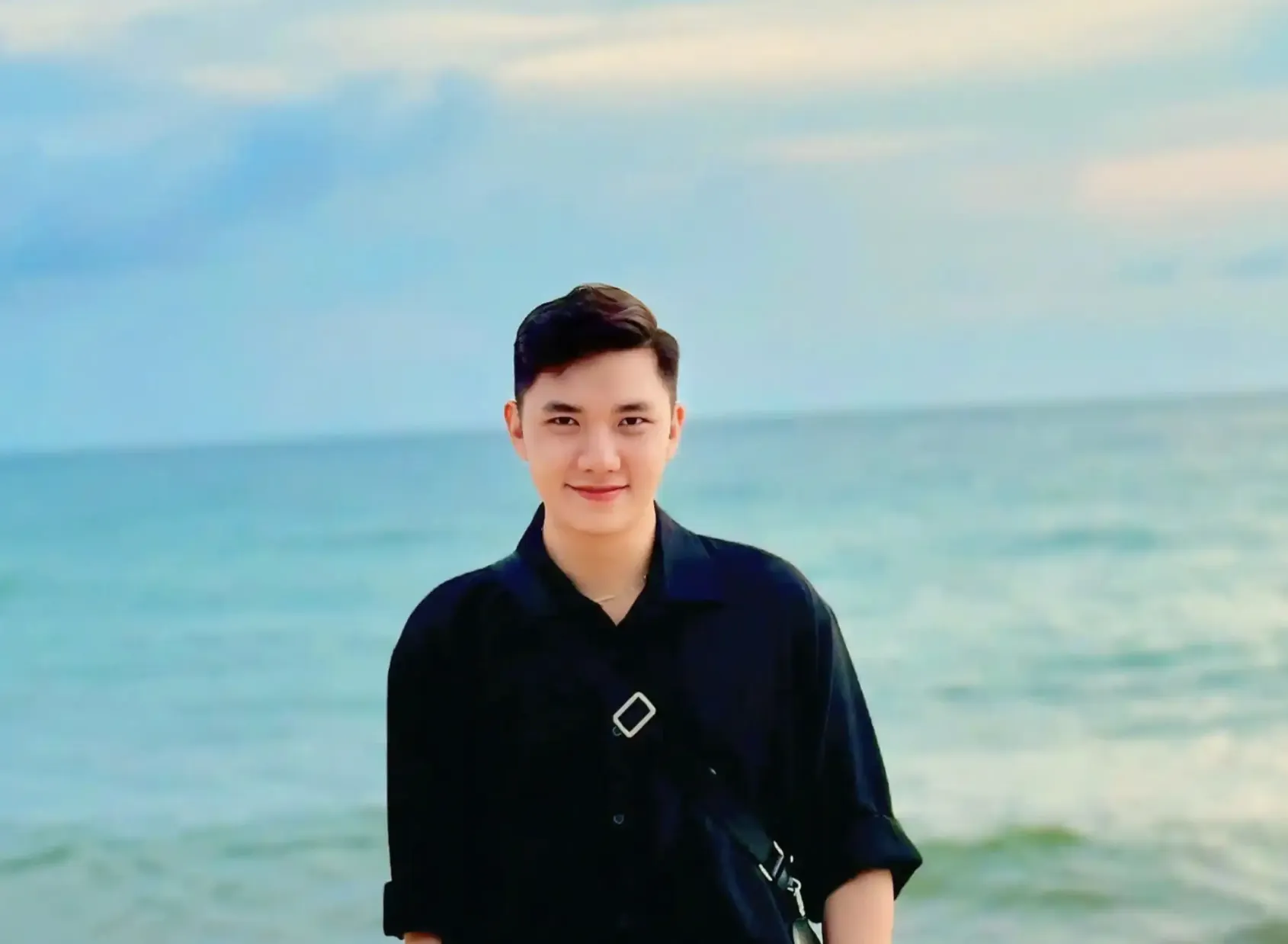
Danish Nguyen
Danish Nguyen is a renowned travel blogger in Vietnam with over 5 years of experience sharing unique travel experiences. With a passion for exploring new places, Danish captures incredible moments and provides readers with valuable tips to discover the beauty of his homeland.



